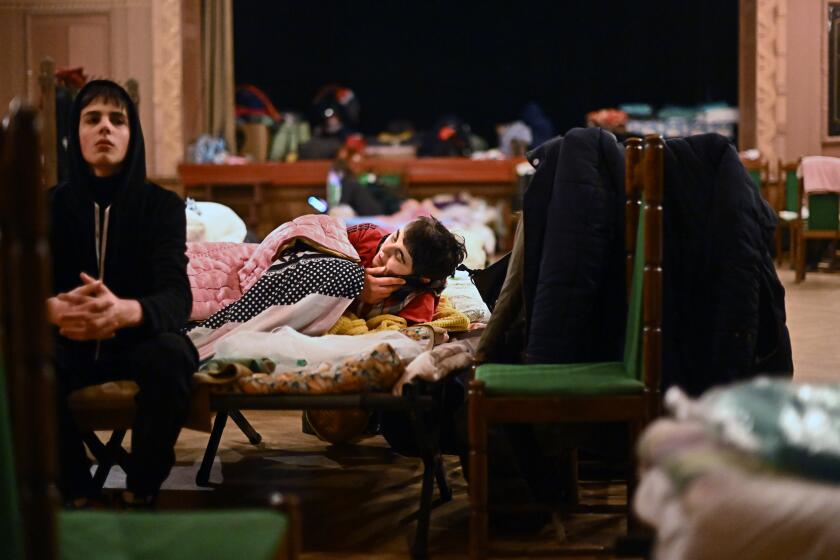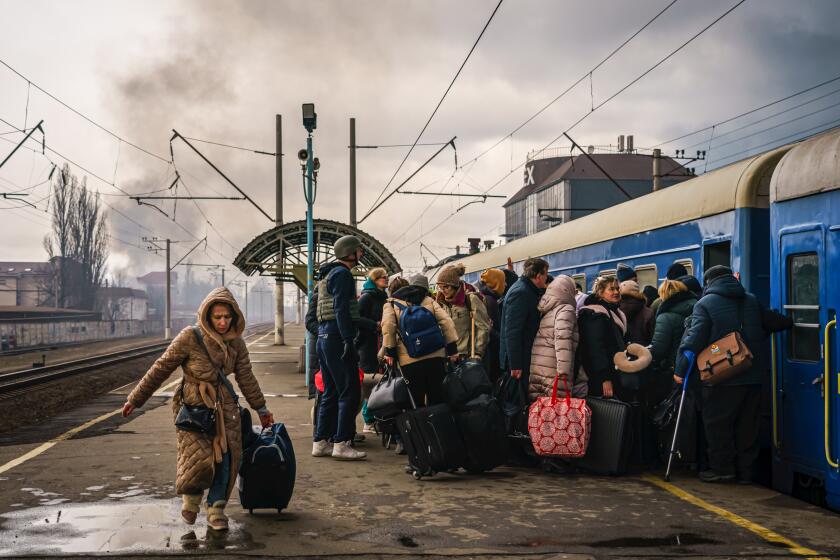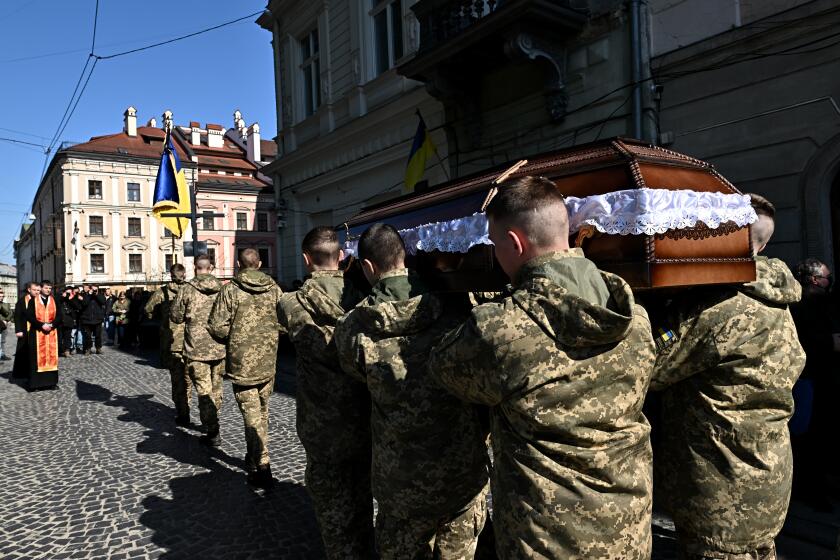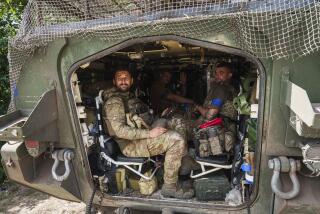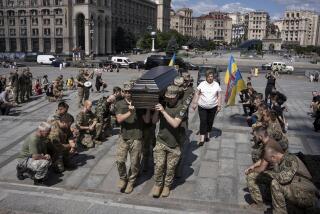To avoid bottleneck in Poland, Ukrainian refugees head south
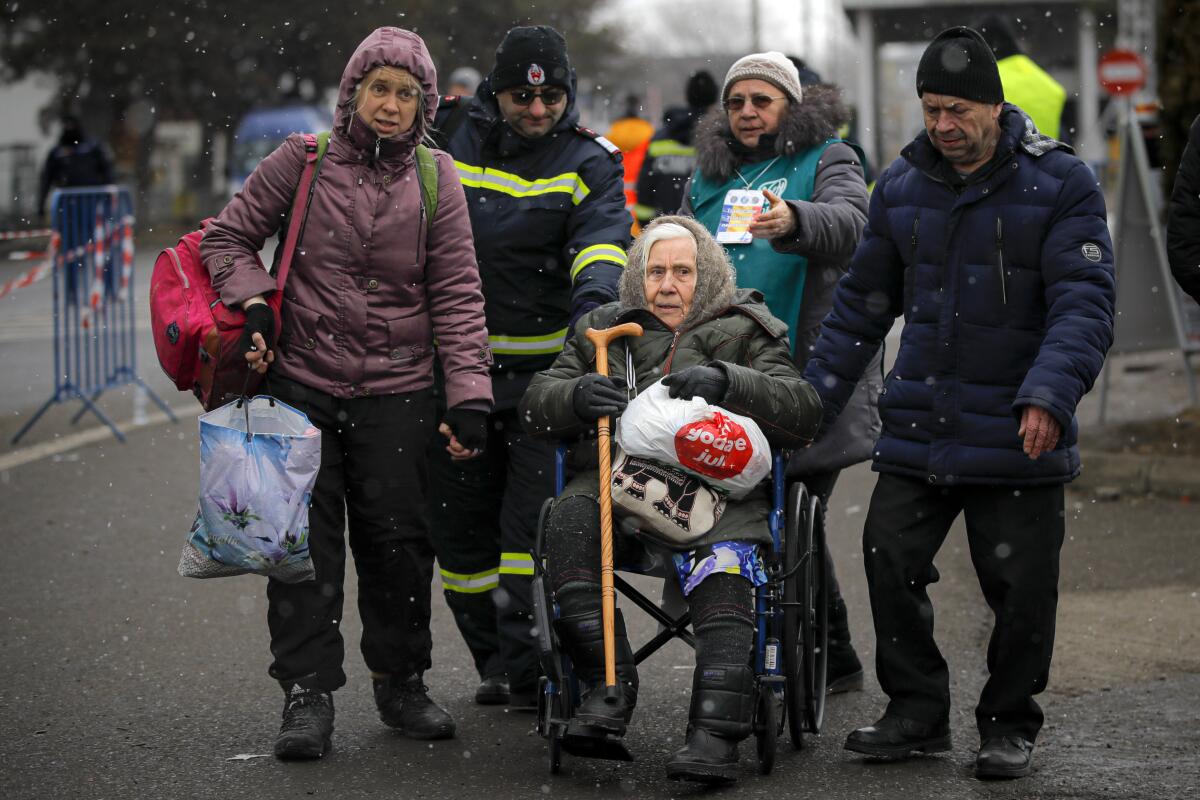
- Share via
SIGHETU MARMATIEI, Romania — Just last month, Yana Bebko strolled across Kyiv’s Independence Square with Dario Boehm — a German man she’d met on a matchmaking site — reassuring him that there was no way Russian President Vladimir Putin would invade Ukraine. Two weeks later, Russian tanks rolled across the border, bombing buildings and entire cities. Hundreds have been killed, and more than 2 million have become refugees.
Since Russia’s invasion, the western Ukrainian city of Lviv has become a treacherous bottleneck. Local authorities estimate that 100,000 people arrived on Friday, and at least another 100,000 on Saturday. On Tuesday, Lviv Mayor Andriy Sadovyi said the city was struggling to house and feed more than 200,000 internally displaced people. He appealed for help from international and humanitarian organizations.
On the roads connecting Lviv to Poland, cars are backed up for miles, and with masses on foot, it is taking days just to pass border security, with little available shelter in the freezing cold.
“There’s no way through, and if you go, it’s not safe,” said Bebko, 31, who works for a fashion label in Kyiv, explaining that not only were the lines too long, but the train journey to Lviv now seemed too dangerous as the mayhem of war had people “fighting to get on.”
More than 1 million Ukrainians who instinctively headed west — away from the Russian forces — have already crossed into Poland, and countless more who are still trying to get there must now wait for days, or abandon their plans altogether. It’s the fastest-paced refugee crisis Europe has seen since World War II, the United Nations has said.
Bebko is among the hundreds of thousands who decided that they stood a better chance of making it out through Hungary, Slovakia and Romania — all members of the North Atlantic Treaty Organization and the European Union — which are now seeing hundreds of thousands arrive.
Residents trying to leave Sumy and Mariupol are part of the exodus from Ukraine. But will sanctions stop Putin? Poland stuns U.S. with plane offer.
Many refugees have traveled for days through Ukraine’s countryside, taking slow-moving trains and hitching rides through winding roads to places like Solotvyno, a sleepy mountain town of about 8,500 people that borders Romania. It’s one of Ukraine’s smallest border crossings, but even here, thousands have bidden farewell to their brothers, fathers, sons and husbands. Adult men up to age 60, who wouldn’t be allowed to leave even if they wanted to, stay to defend Ukraine’s cities.
Their farewells are anything but rushed: Scores of cars snake up Solotvyno’s hilly roads, and hundreds sit in line for hours. Some carry small pieces of luggage, others only their backpacks, filled with hastily packed clothes and documents.
When young Ukrainian soldiers finally wave them through the passport checks, the women and children cross the narrow, wooden bridge over the Tisza River to enter Romania.
“We want to enjoy the blue sky — a sky without bombs,” Bebko said, her perfectly manicured fingernails juxtaposed against a plastic cup of hot tea poured by a relief volunteer minutes after she arrived in Sighetu Marmatiei, on the Romanian side of the border. Next to her, her friend Viktoriya Nikitenko, whom she’s known for more than 20 years, turned her face toward the sun.
People clamored to board trains, fled on foot and navigated a river Friday to escape Irpin, Ukraine, as Russian forces continued their advance toward the capital, Kyiv.
At first, the refugees came from villages in this sparsely populated swath of western Ukraine, encompassed by the Carpathian mountains. But “there are so many people coming from the bigger cities now,” said Madalina Tamas, one of the lead coordinators for the many nongovernmental organizations and civilians in Sighetu Marmatiei offering free sandwiches, blankets, translation and legal services.
About 7,000 people have already registered, she said. As those who remain in Ukraine are beginning to run out of food and water, and with many no longer considering Lviv safe, she’s preparing the site for “many, many more,” she said.
The journey to safety is treacherous. Parts of the country’s roads are destroyed or barricaded, and with bridges demolished to stop Russia’s advances, civilians are forced to balance over rickety planks to cross rivers. Some of the humanitarian corridors created to allow trapped civilians to escape have been attacked by Putin’s forces. One such attack, witnessed by journalists, killed three members of a family of four.
Yet as supplies were running low in the dark, cold basements and subway stations serving as bomb shelters, the civilians who arrive here say they’d grown so desperate that they risked the journey anyway.
Bebko and Nikitenko, 42, were relieved to have made it out in time. They hadn’t even tried the Lviv route — the stories, they said, were too daunting. Instead, they weighed the alternatives, considering roadblocks, the areas under siege, the country’s railway lines and their network of friends and family who could help along the way. “If you make it out, I will fetch you — wherever that is,” Boehm, the German Bebko had met online, told her.
Almost 800,000 Ukrainians have fled to Poland as Russian forces push farther into Ukraine.
“This was the only chance for us,” Bebko said of the Solotvyno crossing. Her father, a businessman, and her brother, who owns three bars, are fighting in the war, while her mother is trapped in her hometown, Kherson. “Fourteen people in one house,” all sheltering in the basement, she said. Kherson fell to Russian troops this week, but thousands of locals are now taking to the streets, waving Ukraine’s blue-and-yellow flag to defy the Russian occupation.
Aware that none of the new arrivals came to stay in the remote mountain town, Romanians have supplied free buses or private rides. One man had come from the Czech Republic with a bus, and two biology students had driven their camper van from Slovenia to take refugees back.
Bebko and Nikitenko awaited Boehm. “Our hero,” Bebko said, a tired smile on her face as he pulled up in his black Mercedes. The spare seats were quickly filled by Tatjana and her 6-year-old twin daughters, Adina and Ariana. Tatjana, who declined to give her last name, worked in Ukraine on the production line, making pillows for a Germany-based company. Before having her children, she worked at hotels and bars in Germany. Her husband works in the Czech Republic, where she and the twins were headed.
All of them said they hoped to return to Ukraine soon, when the war is over. “Ukraine will win,” Tatjana said. Bebko nodded and added: “I just hope everybody will still be alive.”
Hruby is a special correspondent.
More to Read
Sign up for Essential California
The most important California stories and recommendations in your inbox every morning.
You may occasionally receive promotional content from the Los Angeles Times.
